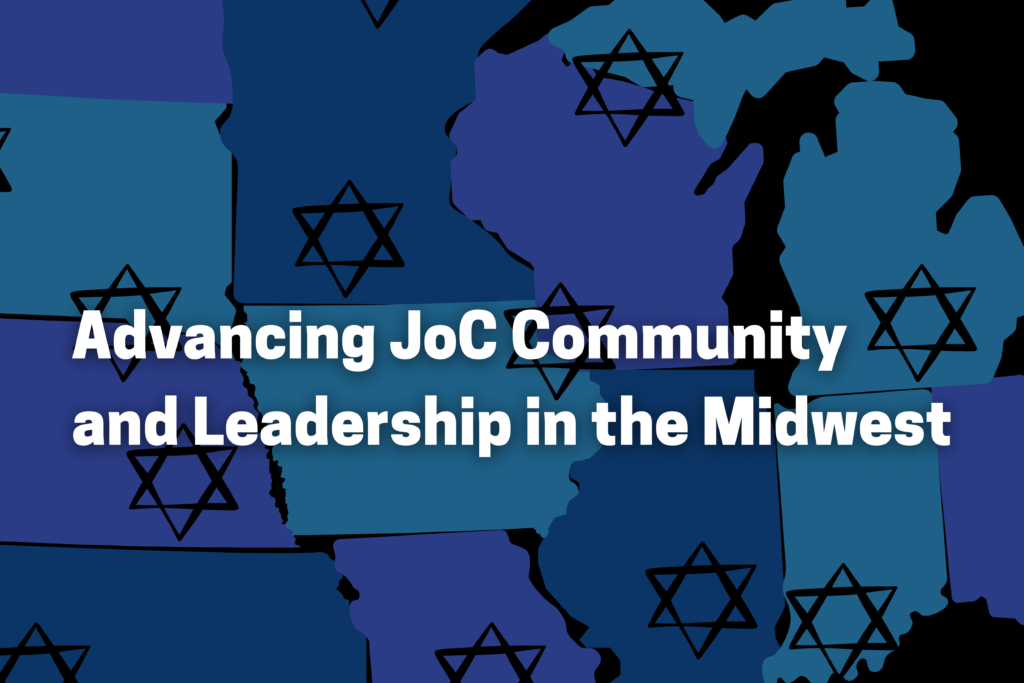
The Edot Midwest Regional Jewish Diversity Collective, or “Edot” for short, is a network of partnerships dedicated to fostering and affirming Jewish racial and ethnic diversity across the Midwest. Edot uplifts and nurtures the leadership of Jews of Color, and increases access to community for Jewish families of color in the region. Amanda Crichlow Silva, a Mexican-American Jew who is Edot’s Development and Communications Specialist, is passionate about this work. Alongside Edot’s director and longtime Jewish educator and leader Shahanna McKinney-Baldon, Crichlow Silva empowers Jews of Color in the Midwest to thrive as their authentic selves.
Due to the higher concentration of Jewish communities on the coasts, the Midwest is sometimes a forgotten hub of Jewish life. “The Midwest tends to be a really underserved region for Jews in general, but specifically for Jews of Color,” Crichlow Silva explained. McKinney-Baldon and Crichlow Silva—as well as the rest of the Edot team—are Midwesterners themselves, and believe that uplifting JoC leaders in the Midwest is essential for a thriving future for the region’s Jewish community.
Crichlow Silva is originally from the small town of Minden, Nebraska, and moved to Omaha to study religious studies and sociology during her undergraduate and graduate years. During college, she became more involved with the Omaha Jewish community. After graduating, she began her career working in Holocaust Education at the Jewish Federation. “That’s when I started taking my Jewish identity more seriously, and trying to make more connections and friendships in the community,” she said.
“Omaha tends to have a Jewish community which is older and predominantly white, which was difficult for me.” Growing up in a Mexican-American household meant that Crichlow Silva was always identified as a person of color, but others’ perceptions of her specific identity have “ebbed in and out” at various points of her life and in different social contexts. Her experiences as a person of Color, however, have had lasting impacts on her work and values. “My lived experience includes a history of incarceration in my family, deeply felt fear of the police, intergenerational poverty…all of which shape my worldview.”
Rooted in her worldview as a Jewish woman of Color, Crichlow Silva believes the Jewish community must engage with the realities of a structurally racist society. However, she sometimes felt that her community was unwilling to discuss difficult topics like white supremacy. She has occasionally struggled with “the sheltering that our community sometimes uses to avoid talking about the hard things,” she explained, “and so within the Jewish community, I was always a little bit of a thorn in people’s sides.”
Notably, this refusal to shy away from difficult topics informs Crichlow Silva’s work at Edot and her role as a Jewish leader more broadly. In previous roles, she spearheaded programming specifically intended to confront issues like structural racism and white supremacy: “I always led my programming around identity, and the question of how we can break down barriers to talk about racism and try to build coalitions of people in Omaha,” she said. Though this work can be emotionally draining, she has seen firsthand its positive impact on communities, and is proud to be part of Edot, which deeply values such programming. One example of successful Edot programming was a ceremonial fire in celebration of the Autumn Equinox and Ten Days of Awe led by Jewish Indigenous Americans. Other intersectional cultural programs include an annual Hanukkah fry-off, which combines Midwestern comfort foods with Jewish tradition. By supporting communal gatherings that showcase and support various intersectional JoC identities, Edot paves the way for diversity in Midwestern Jewish leadership.
Another way Edot invests in the future of JoC leadership is through its partnership with JOIN for Justice. Edot hosts two JOIN Jews of Color Organizing Fellows, Chelsea Cross and Sharah Hutson, the latter of whom works closely with Crichlow Silva to expand Edot’s communications and online organizing capacities. Currently, Hutson is supporting Crichlow Silva on an oral history project where they hope to interview at least twenty Midwestern Jews of Color about their experiences and hopes for the region’s Jewish community. “I want [the project] to be intergenerational, and really talk about identity and what it’s like to be a JoC in predominantly white communities,” Crichlow Silva said.
Thanks to the efforts of Edot and its dedicated team, the future for JoC in the Midwest is already brighter and more connected than ever before. The devotion the organization shows to fostering connectivity and support across a widely dispersed region is particularly powerful in a part of the country where non-white Jews have very little visibility, are often geographically isolated from one another, and are often excluded from JoC dialogue that tends to be concentrated coastally. Crichlow Silva sees the Midwest as a place of profound potential for Jews of Color due to the diversity—race and otherwise—that already exists within the JoC population: “For us, being multiracial, being multiethnic, having different perspectives, having different theological leanings, are all elements of how we view our Judaism. And for me, I think that diversity can make our Jewish community resilient, and also help us move forward and build from some of the trauma our people have faced.”
